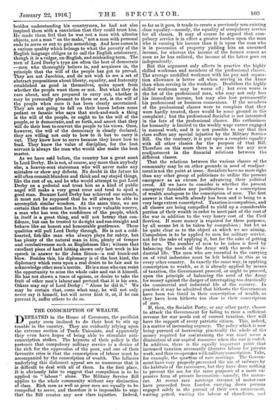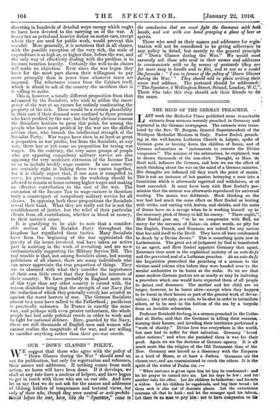THE CONSCRIPTION OF WEALTH.
DEFEATED in the House of Commons, the pacificist party seem inclined to do their best to stir up trouble in the country. They are evidently relying upon the extreme section of Trade Unionists, and apparently they even have hopes of being able to stimulate anti- conscription strikes. The keynote of their policy is the pretence that compulsory military service is a device of the rich for the oppression of the poor, and one of their favourite cries is that the conscription of labour must be accompanied by the conscription of wealth. The fallacies underlying this dishonest appeal are so numerous that it is difficult to deal with all of them. In the first place, it is obviously false to suggest that compulsion is to be applied to " labour " alone. The Military Service Bill applies to the whole community without any distinction of class. Rich men as well as poor men are equally to be compelled to serve, and therefore it is impossible to urge -that the Bill creates any new class injustice. Indeed, so far as it goes, it tends to create a previously non-existing class equality—namely, the equality of compulsory service for all classes. It may of course be argued that com- pulsory service is in effect a greater burden upon the man who is earning his income than it is upon the man who is in possession of property yielding him an unearned income, for whereas the income of the former ceases as soon as he has enlisted, the income of the latter goes on independently.
But this argument only affects in practice the highly skilled workman and members of the professional classes. The average unskilled workman with his pay and separa- tion allowance is better off when serving in the Army than when serving in the workshop. Doubtless the highly skilled workman may be worse off ; but even worse is the lot of the professional man, who may not only lose his immediate income, but may also lose permanently his professional or business connexions. If the members of the professional classes were to complain that they were hardly treated, there would be some ground in the complaint ; but the professional Socialist is not interested in the fate of the professional classes. His enthusiasm for humanity is limited to the weekly wage earner engaged in manual work, and it is not possible to say that this class suffers any special injustice by the Military Service Bill. On the contrary, it is put upon a complete equality with all other classes for the purpose of that Bill. Therefore on this score there is no ease for any new readjustment in the financial relations between the different classes.
That the relations between the various classes of the community may be on other grounds in need of readjust- ment is not the point at issue. Socialists have no more right than any other group of politicians to utilize the present emergency as an excuse for advancing their political creed. All we have to consider is whether the present emergency furnishes any justification for a conscription of wealth analogous to the conscription of men. The first answer is that wealth already has been and is being to a very large extent conscripted. Taxation is compulsion, and all classes are being compelled to yield up a considerable portion of their wealth in order to meet part of the cost of the war in addition to the very heavy cost of the Civil Services. If more money is required for these purposes, by all means let it be taken by compulsion ; but let us be quite clear as to the object at which we are aiming. Compulsion is to be applied to men for military service, not for the sake of applying it, but for the sake of getting the men. The number of men to be taken is fixed by balancing the needs of the Army with the needs of in- dustrial life. The men who are essential to the carrying on of vital industries must be left behind in this as in every other country. In exactly the same way, in applying conscription to wealth, as it is already applied by means of taxation, the Government proceed, or ought to proceed, upon the principle of balancing the need of the Army for money against the danger of interrupting too drastically the commercial and industrial life of the country. In practice it may be admitted that hitherto the Government have been too timid in their conscription of wealth, as they have been hitherto too slow in their conscription of men.
If, then, the Socialist Party, or any other party, choose to attack the Government for failing to raise a sufficient revenue for war needs out of current taxation, they will have the support of every patriotic citizen. This, indeed, is a matter of increasing urgency. The policy which is now being - pursued of borrowing practically the whole of the money required for maintaining the war must mean a diminution of our capital resources when the war is ended. In addition, there is the equally important point that increased taxation necessarily liberates labour for private work, and thus co-operates with military conscription. Take, for example, the question of race meetings. The Govern- ment have very properly prevented the use of railways by the habitues of the racecourse, but they haye done nothing to prevent the use for the same purposes of a more ex- pensive form of private locomotion—namely, the motor- car. At recent race meetings streams of motor-cars have proceeded from London carrying down persons engaged solely in the pursuit of their own amusement, wasting petrol, wasting the labour of chauffeurs, and diverting in hundreds of detailed ways energy which ought to have been devoted to the carrying on of the war. A heavy tax on petrol and heavier duties on motor-cars, except where they are used for public work, would prevent this scandal. More generally, it is notorious that in all classes, with the possible exception of the very rich, the scale of expenditure is as high as, or higher than, before the war, and the only way of effectively dealing with the problem is to increase taxation heavily. Certainly the well-to-do classes will make no objection. Ever since the war began they have for the most part shown their willingness to pay more promptly than in peace time whatever taxes are imposed. The reluctance comes from the Cabinet itself, which is afraid to ask of the country the sacrifices that it is willing to make. This is, however, a totally different proposition from that advanced by the Socialists, who wish to utilize the emer- gency of the war as an excuse for entirely confiscating the property of the rich. There would be a certain plausibility in their case if their demand were confined to those persons who have profited by the war; but for fairly obvious reasons the Socialists hesitate to press this point, for among the people who have most profited by the war are the skilled artisan class, who furnish the intellectual strength of the Socialist Party. War wages have risen in at least as great a proportion as war profits, but from the Socialists, at any rate, there has as yet come no proposition for taxing war wages. On the contrary, the very same groups of people who are opposing compulsory military service are also opposing the very moderate extension of the Income Tax so as to include weekly wage earners. In one sense they are certainly right in linking these two causes together, for it is clearly unjust that, if one man is compelled to serve, his previous comrade in the workshop should be allowed to remain at home earning higher wages and making no effective contribution to the cost of the war. The extension of the Income Tax to wage-earners is therefore truly a counterpart of compulsory military service for all classes. In opposing both these propositions the Socialists reveal their hand. What they are really out for is not the establishment of justice, but the relief of their particular clients from all contribution, whether in blood or money, to their nation's cause.
It is gratifying to be able to note that a consider- able section of the Socialist Party throughout the kingdom has repudiated these tactics. Many Socialists have from the beginning of the war appreciated the gravity of the issues involved, and have taken an active part in assisting in the work of recruiting, and are now enthusiastically supporting the Military Service Bill. The real trouble is that, not among Socialists alone, but among politicians of all classes, there are many individuals who can never appreciate the true proportion of things. They are so obsessed with what they consider the importance of their own little creed that they forget the interests of their country. We have probably in England more men of this type than any other country is cursed with, the reason doubtless being that the strength of our Navy (for the reduction of which they generally voted) has secured us against the worst horrors of war. The German Socialists almost to a man have rallied to the Fatherland ; pacificism is practically unknown. In France in exactly the same way, and perhaps with even greater enthusiasm, the whole people has laid aside political creeds in order to work and to fight for national defence. Here, guarded by the Navy, there are still thousands of English men and women who cannot realize the magnitude of the war, and are willing to sacrifice anything rather than their pre-war creeds.



































 Previous page
Previous page